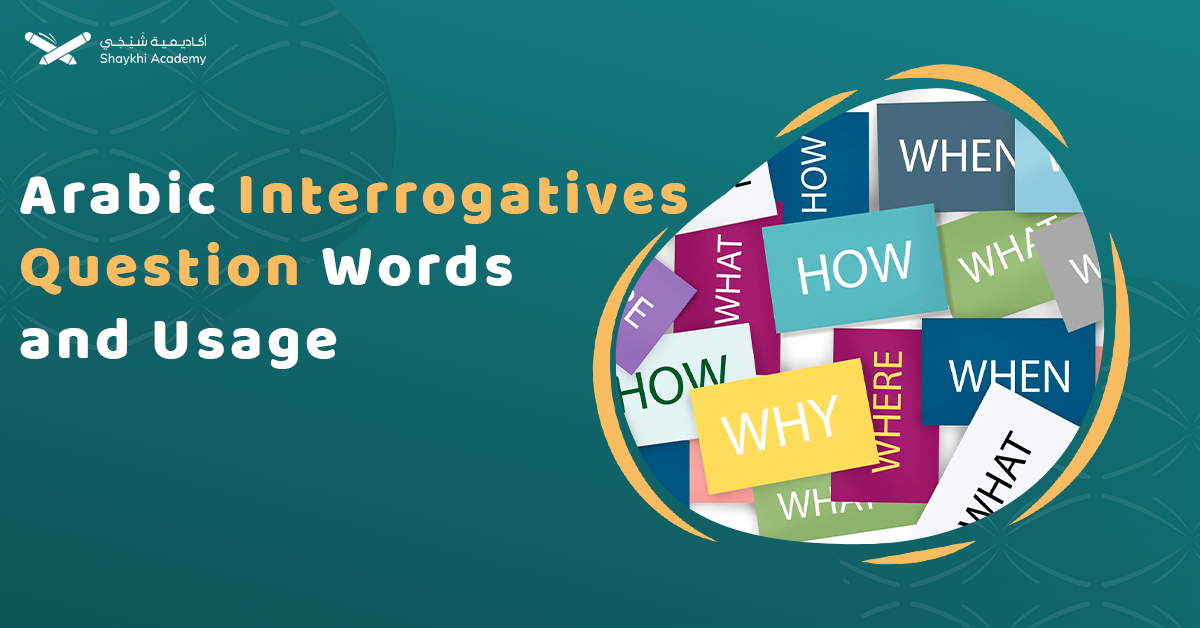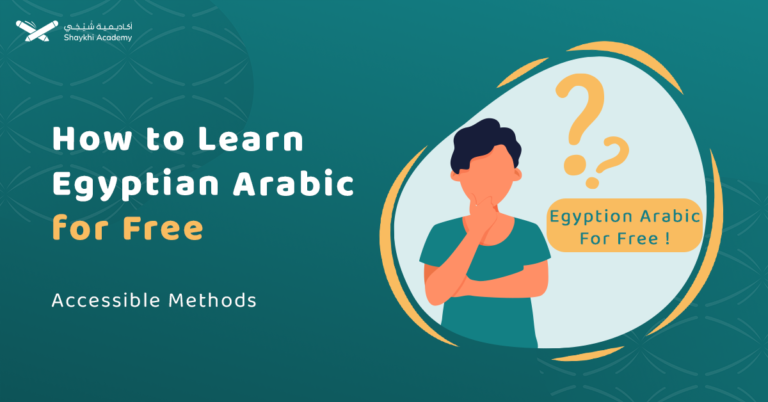The great importance of Arabic Interrogatives appears during your learning journey since you need to ask questions in class and in daily situations. You ask yourself how to ask in Arabic from the first day. You can ask in Arabic easily, there are versatile interrogatives for all types of details you may need to ask about.
This topic will discuss different types of Arabic Interrogatives with simple examples to deepen your understanding. After this, ask in Arabic whatever you want.
Arabic Interrogatives
Arabic Interrogatives or أدوات الاستفهام (Istifhām) particles are a group of Questioning tools that may be a noun or a particle that is used to ask about something. They form the first words of Questions. They form an essential part of question sentences. Here is detailed information about the most common interrogatives.
1. Particles هل (HL) and (A) أ:
They are the only particles in the Arabic Interrogatives, the rest are nouns. They do not have specific English equivalents.
Their Usage in Arabic is similar to English Questions that start with auxiliary verbs. These two particles are used for yes or no questions in all Arabic tenses. They can be used to offer a choice of options with the particle إما=Iema which means or:
The answer is either to prove or disprove the information in the sentence. This means that the answer will be one of the yes and no equivalents in Arabic that are explained in the following table
| Sentence in the question | yes | no |
| proven | نعم | لا |
| Disprove with negative particles after أ such as“أليس – ألم – ألن – ألا” | بلي | كلا |
See the following table which includes some examples to clarify how to use these in different sentences:
| Sentence | translation | transliteration | How to answer |
| أتذهب إلى المدرسة؟ | Do you go to the school? | A-tadhhabu ila al-madrasa? | نعم ….yesلا …..no |
| هل تلعب بالكرة؟ | Do you play by the ball? | Hal tala‘bu bil-kura? | نعم ….yesلا …..no |
| أليس العمل سبيل النجاح؟ | Isn’t work the path to success? | A-laysa al-‘amal sabil al-najah? | بلى ….yesكلا …..no |
| هل تريد تفاح ام خيار؟ | Do you want apples or cucumbers? | Hal turidu tuffah am khiyar? | According to your choice.Applesأريد تفاحًا Cucumberأريد خيارًا |
2. Interrogative nouns ما (ma) and ماذا (maza) :
These interrogative nouns are used to inquire about non-human things but ما is used also to ask about the description or the case of something. For example, see the following table:
| Sentence | translation | transliteration |
| ماذا تأكل؟ | What are you eating? | Māzā ta’kul? |
| ما هو لون الكتاب؟ | What is the color of the book | Mā lawn al-kitāb? |
| ما اسمك؟ | What is your name? | Ma ismuk? |
In the former table, the second sentence shows that the interrogative ما is used for inquiring about the description of something.
It is important to distinguish between interrogative noun ما and exclamatory form and this can be done by the attention to the grammatical case of the sentence and from the context. See the following example:
ما أجمل السماءَ!
ما أجمل السماءُ؟
When you say the first sentence, this means that you are amazed by the beautifulness of the sky. The second means that you inquire about the thing that causes the beautifulness of the sky.
This is known from the grammatical case of the word “السماء”. In the first sentence, it is an accusative of distinction, so it has Fatha, while in the second sentence, it is the Subject of the predicate verb “أجمل,” in the nominative case ( مرفوع).
3. The Interrogative من (Mn):
This is a questioning tool that inquires about the subject. Let’s make it easy with examples.
| sentence | Translation | transliteration |
| من شرب اللبن؟ | Who drank the milk? | Mn shrib el labn? |
| من أكل التفاح؟ | Who ate apples? | Mn Akla al tofaha? |
4. Time interrogative متى Mata:
متى (Mata) is an interrogative means (when). It used to know the time of the event mentioned in the sentence. You can answer this question using the special expressions for time. Keep some common examples provided in the following table.
| English | transliteration | Arabic |
| In the morning | Ṣabāḥan | صباحًا |
| In the afternoon | Ẓuhran | ظهرًا |
| In the evening | Laylan | ليلًا |
| tomorrow | Ghadan | غدًأ |
| today | Al-yawm | أليوم |
| yesterday | Ams | أمس |
| tonight | Al-layla | الليلة |
| Last week | Al-usbū‘ al-māḍī | ألأسبوع الماضي |
5. Place Interrogative أين Ayna:
أين(Ayna)is an interrogative means (when). It used to knowthe place of the event mentioned in the sentence. common examples are explained below.
| sentence | Translation | transliteration |
| أين تسكن؟ | where do you live? | Mn shrib el labn? |
| أين المدرسة؟ | Where is the school? | Ayna al-madrasah? |
| أين المسجد؟ | Where is the mosque? | Ayna al-masjid? |
Simply, say “أين” followed by the thing you want to know its place. This can be very useful if you want to learn Arabic during business. We have designed a Business Arabic Course that will be very helpful to you.
6. Cause Interrogative لماذا (Lymaza):
This interrogative is used to ask about the cause of the verb and the answer can be an object of purpose or a sentence that explains the reason by using particles such as the following table.
| Arabic Tool | Translation | Transliteration | For example, لماذا تذاكر |
| لِـ | For, in order to | Li | للفهم |
| من أجل | For the sake of, in order to | Min ajl | من أجل الفهم |
| بسبب | Because of, due to | Bisabab | بسبب الامتحان |
| لأن | Because | Li’anna | لأنن عندي امتحان |
| كي / لكي | In order to, so that | Kay / Likay | لكي انجح |
| حتى | So that, until | Ḥattā | حتي أنجح |
7. Questioning Tool كيف (Kyfa):
Generally, It means (how). It is used to inquire about the method, the condition, and the manner. See the following table to learn common examples.
| sentence | Translation | transliteration |
| كيف حالك؟ | How are you? | Kyfa Halek? |
| كيف تذاكر؟ | How do you study? | Kyfa tozakir? |
| كيف تذهب إلى المدرسة؟ | How do you go to school? | Kyfa tzhb Ila al madrassa? |
8. كم (km) interrogative noun:
This questioning tool is used to know the number of something similar to (how many) and (how much) in the English language. The following table explain 3 common example:
| sentence | Translation | transliteration |
| كم الساعة الآن؟ | What time is it now? | Km al saaa alan? |
| كم تستغرق لتصل المنزل؟ | How much time does it take to reach home? | Kam tastaġriq litaṣil al-manzil? |
| كم عدد المرات؟ | How many times? | Kam ‘adad al-marāt? |
The Arabic word كم has two meaning similar to ما. It can be used for exclamations. For example, see the following table
| Type | Arabic Example | Transliteration | Translation | Meaning/Context |
| Interrogative “كم” | كم كتابًا قرأت؟ | Kam kitāban qara’ta? | How many books did you read? | Asking for a number or quantity (question). |
| Informative “كم” | كم كتابٍ قرأت هذا الشهر! | Kam kitābin qara’ta hādhā al-shahr! | How many books have you read this month! | Expressing amazement or emphasis (exclamation). |
The word after كم differ in its grammatical case according to the case. if “كم” is Interrogative, it should be in the causative case. If “كم” is informative, the word after it must be in the genitive case.
9. أي (ayy) as interrogative noun
The Arabic word أي means “any”. It can be used to ask about anything according to the noun after it. This is similar to which in the English language. See the following examples that explain this.
| sentence | Translation | Can be replaced by | transliteration |
| أي لون تريد؟ | Which color do you want? | ما as it asks about non-human objects | Ayy lawn turīd? |
| أي شخص جاء؟ | Which person came? | منsince it asks about the subject. | Ayy shakhs jā’a |
Examples of Arabic Interrogatives in situations:
Although Arabic interrogatives are used primarily to inquire about unknown information, they can used in other functions. They can be used to provide Figurative Meanings. Since the tone and context influence the meaning, allowing interrogatives to express curiosity, criticism, exclamations or other meanings.
The following table gives you two examples to clarify the figurative meaning of the Arabic interrogative.
| Arabic | Translation | Another meaning |
| هل درست؟ | Did you study? | This sentence can be used to express Denunciation if you understand from the context that the person does not study. |
| لماذا فعلت ذلك؟ | Why did you do this? | This sentence can be used to express Blame (reproach or rebuke) for the person who did a bad thing |
Interrogatives differ in regional Arabic dialects, often simplified for casual use. You can target the Levantine dialect with expert tutors in our Levantine Arabic Classes.
Exercises For Arabic Interrogatives
This is the time to check your understanding. I will provide simple examples and you practice more in our Arabic group classes.
1. The following table gathers the most common interrogatives used. Complete the empty boxes.
| particle | translation | Used to ask about |
| هل | ||
| which | ||
| من | ||
| The place |
2. Make suitable questions for these sentences:
- اسمي أحمد
- ألعب مع صديقي كرة القدم
- عدد أيام الأسبوع سبعة
Learn more about Arabic interrogatives with Shaykhyi Academy:
All details about questioning and more in our Arabic grammar course. You can start from any place and at a time suitable for your schedule. It does not matter if you do not have an Arabic background. Our specialists provide you with a suitable program that aligns with your skills.
Understanding the basic rules opens the door for you to deepen your Arabic fluency on an intact basis. Start with us and achieve your dreams.
Why Shaykhi Academy?
- Expert Native Tutors: Learn from highly qualified native Arabic speakers.
- Flexible Scheduling: Tailor your classes to fit your busy life.
- Affordable Learning: Access top-quality education at a price that suits you.
- Global Access: Study from anywhere in the world.
Explore Our Arabic Courses:
- Noorani Qaida: Build a strong foundation in Quranic Arabic.
- Comprehensive Arabic Courses: Master the Arabic language, from beginner to advanced levels.
- Fusha Arabic Classes: Delve into Modern Standard Arabic, the key to understanding literature, media, and formal communication across the Arab world.
- Quranic Arabic Course: Enhance your connection with the Quran by learning the language in which it was revealed.
Start Your Arabic Journey Today! Whether you’re just starting or looking to deepen your knowledge, Shaykhi Academy is here to support your journey. Book your free trial now and begin your path to Arabic mastery!

Conclusion:
Arabic interrogatives allow precise inquiries about many aspects of the sentence. There are many Interrogative particles and each of them has a meaning and implication.
They also have many figurative Meanings and from this instance, They play an essential role in the language’s richness.

















































